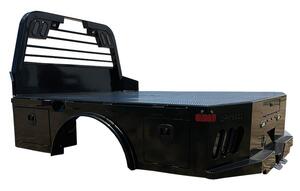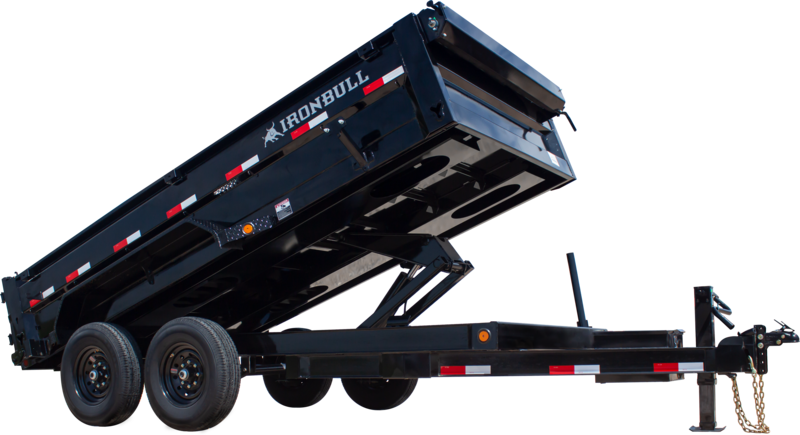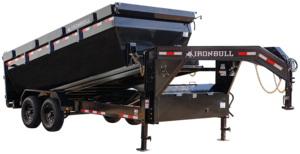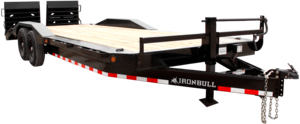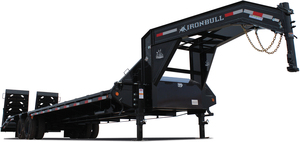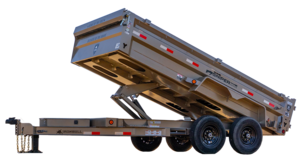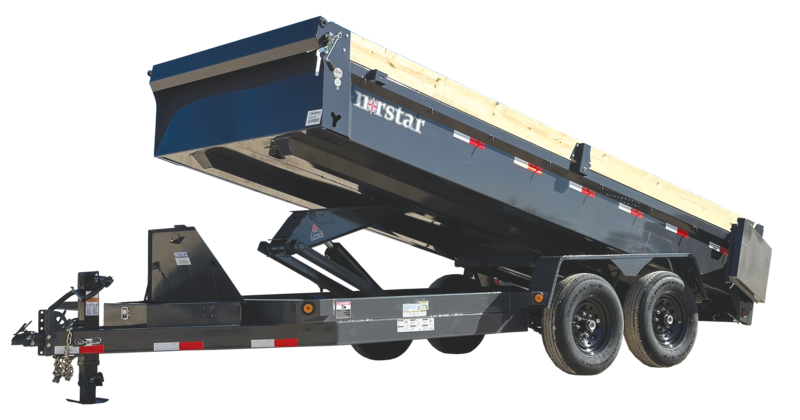Understanding Trailer Payload Capacity

When it comes to towing trailers, understanding the payload capacity is a must for safe and efficient transportation.
In this informative blog post, we will demystify the concept of payload capacity for trailers. This essential guide also covers everything you need to know about payload capacity, including its definition, importance, and how to determine it for your trailer.
Whether you're an experienced trailer owner or considering purchasing one for the first time, this post will provide valuable insights that will help you make informed decisions about your trailer's capabilities.
What is Payload Capacity?
Payload capacity refers to the maximum amount of weight that a vehicle, spacecraft, or aircraft can carry, including passengers, cargo, and any additional equipment. It is a crucial factor to consider when designing and operating transportation systems, as it directly impacts the efficiency, performance, and safety of the vehicle.

Importance of Understanding Payload Capacity
Understanding payload capacity trailer is essential for several reasons:
Safety
Overloading a vehicle can lead to accidents, mechanical failures, and reduced handling capabilities. Knowing the payload capacity ensures that the vehicle operates within its design limits, reducing the risk of accidents or breakdowns.
Performance
A vehicle's performance, such as acceleration, braking, and fuel efficiency, can be significantly affected by its payload. By understanding the trailer weight capacity, operators can optimize the vehicle's performance and reduce wear and tear on its components.
Regulatory compliance
Many jurisdictions have regulations and laws governing the maximum allowable payload for different types of vehicles. Understanding trailer load capacity helps operators comply with these regulations and avoid fines or penalties.
Cost-efficiency
Operating a vehicle within its payload capacity can lead to cost savings in terms of fuel consumption, maintenance, and potential damage due to overloading. This is particularly important for businesses that rely on transportation for their operations.
Environmental impact
Overloading a vehicle can lead to increased fuel consumption and emissions, contributing to air pollution and climate change. Understanding payload capacity helps operators minimize their environmental impact by ensuring their vehicles are loaded optimally.

Factors Influencing Payload Capacity
Payload capacity is a critical aspect of vehicle design and operation, as it determines how much cargo, passengers, and equipment a vehicle can safely carry.
Several factors influence a vehicle's payload capacity, including structural limitations, axle and suspension capacities, tire ratings, and hitch weight limitations. Understanding these factors helps operators ensure that their vehicles are loaded within safe limits and comply with regulations.
Structural limitations
The structural design of a vehicle plays a significant role in determining its payload capacity. The vehicle's frame, chassis, and body must be strong enough to support the weight of the payload without causing damage or compromising safety.
Structural limitations can vary depending on the materials used, the design of the vehicle, and its intended purpose. Engineers must take these limitations into account when designing vehicles to ensure they can safely carry the intended payload.
Axle and suspension capacities
Axle and suspension systems are crucial components of a vehicle that support the weight of both the vehicle and its payload. The capacity of these systems directly affects the payload capacity of a vehicle.
Overloading a vehicle can cause excessive stress on axles and suspension components, leading to premature wear, reduced handling capabilities, and potential failure. Consider the axle and suspension capacities when determining a vehicle's payload capacity to maintain safety and performance.
Tire ratings and load range
Tires play a critical role in supporting the weight of a vehicle and its payload. Each tire has a specific load rating and range, indicating the maximum weight it can safely carry. Exceeding these limits can result in tire failure, reduced handling capabilities, and increased risk of accidents.
When determining payload capacity, it is essential to consider the combined load rating of all tires on the vehicle to ensure safe and efficient operation.
Hitch weight limitations
For vehicles towing trailers or other loads, hitch weight limitations are an essential factor in determining payload capacity. The hitch weight refers to the downward force exerted by the trailer's tongue on the vehicle's hitch.
Exceeding the hitch weight limitation can cause damage to the vehicle's frame, reduce handling capabilities, and increase the risk of accidents. It is crucial to consider hitch weight limitations when determining the payload capacity of a towing vehicle to ensure safe and efficient operation.
Considerations for Various Trailer Types
When selecting a trailer for transporting cargo, passengers, or equipment, take note of the unique characteristics of each trailer type. Different trailer types have varying payload capacities, dimensions, and features that impact their suitability for specific tasks.
In this section, we will discuss the key considerations for four common trailer types: utility trailers, enclosed trailers, flatbed trailers, and travel trailers and RVs.
Utility trailers
Utility trailers are versatile, open-air trailers designed for transporting various items, from landscaping equipment to household goods. Key considerations for utility trailers include:
Make sure the trailer can carry the weight of the proposed cargo by checking its payload capacity.
Size and dimensions: Select a trailer with adequate space for the cargo, considering both the length and width.
Accessibility: Look for trailers with features like fold-down ramps or removable sides for easy loading and unloading.
Security: As utility trailers are open, consider how to secure the cargo during transport to prevent theft or damage.
Enclosed trailers
Enclosed trailers offer a fully enclosed and protected space for transporting cargo, making them ideal for moving valuable items, vehicles, or temperature-sensitive goods. Key considerations for enclosed trailers include:
Check the trailer's payload capacity to make sure it can support the weight of the proposed cargo.
Size and dimensions: Choose a trailer with sufficient interior space for the cargo, including height, length, and width.
Ventilation and insulation: For temperature-sensitive cargo, consider trailers with proper ventilation and insulation.
Security: Enclosed trailers provide added security, but consider additional locks or security measures as needed.
Flatbed trailers
Flatbed trailers are open, flat platforms without sides or a roof, making them suitable for transporting oversized or irregularly shaped cargo. Key considerations for flatbed trailers include:
Payload capacity: A trailer's payload capacity will tell you how much weight it can carry.
Size and dimensions: Choose a trailer with a large enough platform to accommodate the cargo's size and shape.
Tie-down points: Look for trailers with multiple tie-down points for securing the cargo during transport.
Permits and regulations: For oversized loads, be aware of any permits or regulations required for transport.
Travel trailers and RVs
Travel trailers and RVs are designed for recreational use, providing living accommodations for extended trips or vacations. Key considerations for travel trailers and RVs include:
Check the trailer's payload capacity to make sure it can support the weight of the passengers, their possessions, and any additional equipment.
Size and dimensions: Choose a trailer with enough living space and storage for the intended number of occupants.
Amenities and features: Consider the desired amenities, such as a kitchen, bathroom, and sleeping arrangements.
Towing vehicle compatibility: Ensure the towing vehicle has the capacity to safely tow the travel trailer or RV.

5 Tips for Maximizing Trailer Payload Capacity
When using a trailer for transporting cargo, you need to maximize the payload capacity efficiently and safely. Proper loading techniques can help you get the most out of your trailer while ensuring the safety of your cargo and reducing the risk of accidents.
Here are the five tips for maximizing your trailer's payload capacity.
Minimizing unnecessary weight
Before loading your trailer, it is crucial to minimize any unnecessary weight. This includes removing any excess or unused equipment, tools, or personal belongings from the trailer.
By reducing the overall weight of your cargo, you can increase the available payload capacity and ensure that you are operating within the trailer's weight limits.
Strategic placement of heavier items
When loading your trailer, place heavier items strategically. Position heavier items over the trailer's axles or as close to the axles as possible. It helps distribute the weight evenly across the trailer and reduces the risk of overloading the hitch or the rear of the trailer.
Proper weight distribution can improve the handling and stability of the towing vehicle and trailer, making it safer and easier to drive.
Stacking and securing cargo
To maximize the available space in your trailer, consider stacking items and using proper cargo securing techniques. This may include using straps, ropes, or bungee cords to secure items in place and prevent them from shifting during transport.
Stacking and securing cargo can help you fit more items into the trailer while ensuring that the load remains stable and safe during transit.
Balancing load distribution
Balancing the load distribution across the trailer is essential for safe and efficient operation. An unbalanced load can cause handling issues, increased tire wear, and potential damage to the trailer or towing vehicle.
Ensure that the weight is evenly distributed from side to side and front to back, with the heaviest items placed over the axles or as close to them as possible.
Considering cargo volume and dimensions
In addition to the weight of your cargo, it is essential to consider its volume and dimensions. Ensure that the trailer's size and shape can accommodate the cargo without overloading or causing unsafe conditions.
This may involve selecting a trailer with a larger payload capacity or a different design better suited for the specific cargo. Proper consideration of cargo volume and dimensions can help you maximize your trailer's payload capacity while ensuring safe and efficient transport.
Careful Planning and Execution
Maximizing your trailer's payload capacity involves careful planning and attention to detail. By following the tips given above, you can securely and efficiently move your cargo while maximizing your trailer's capacity.
If you are looking for a high-quality truck bed or trailer, Norstar Company in Brookston, Texas, is a great option. They offer a wide variety of products, and they are committed to providing excellent customer service.
Get a quote today!






